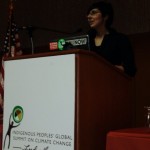For the last 4 days about 500 Indigenous peoples from 80 nations have attended the Indigenous Peoples‘ Global Summit on Climate Change, to create a plan and demand that countries around the world include indigenous people as they respond to climate change.  This conference is unique because it is the largest gathering of Indigenous peoples to discuss climate change.
This conference is unique because it is the largest gathering of Indigenous peoples to discuss climate change.
I was honored and lucky enough to be asked to present offer the opening remarks on Tar Sands in Alberta and it’s effects on future generations on Day One of this gathering. My presentation covered the impacts of tar sands development to the peoples of Fort Chipewyan and future generations.
The purpose of the summit is to allow Indigenous peoples from across the globe to exchange their knowledge and experience in responding to the impacts of climate change, and to develop key messages and recommendations to the Conference of Parties (COP) to the UN Framework Convention on Climate Change in Copenhagen, Denmark in December 2009. To date, Indigenous peoples have been largely uninvolved and excluded from Climate Change negotiations.
Indigenous people who “have contributed the least to the global problem of climate change” are often “on the front lines” of the problem, but their voices are often unheard in climate negotiations, said Patricia Cochran, chairwoman of the Inuit Circumpolar Council, whose group was hosting the summit
“Our indigenous people are saying that the effects of climate change right now [are] affecting our right to practise our culture,” Tom Goldtooth, executive director of the Indigenous Environmental Network, told CBC News on Wednesday.
The issues that Indigenous peoples face with respect to climate change vary from rising coast lines, drought, melting Arctic basins, to extraction projects that further exasperate the effects of climate change. This gathering allowed Indigenous peoples from around the globe to share their stories and ideas on how to move forward within the framework of climate change negotiations.
Indigenous youth, who play a pivotal role in a solutions based approach caucused at the Indigenous Peoples’ Global Summit on Climate Change on Wednesday to define their role in tackling climate change. The Anchorage Daily News covered the voices of this group, including my own here.
Live streaming of the conference available here .
The issue of tar sands and it’s local, national, international impacts are starting to be grasped by the group. With increasing carbon emissions, large scale water consumption and it’s vast destruction to the boreal forests, one of the worlds largest and important carbon sinks, it’s hard not to grasp the far reaching impacts to the overall health and well being of the entire planet.
It is my hope and the hope of all conference delegate that the discussion and declaration developed at this event will push the United Nations Framework Convention on Climate Change to adopt the Declaration on the Rights of Indigenous People within its body.